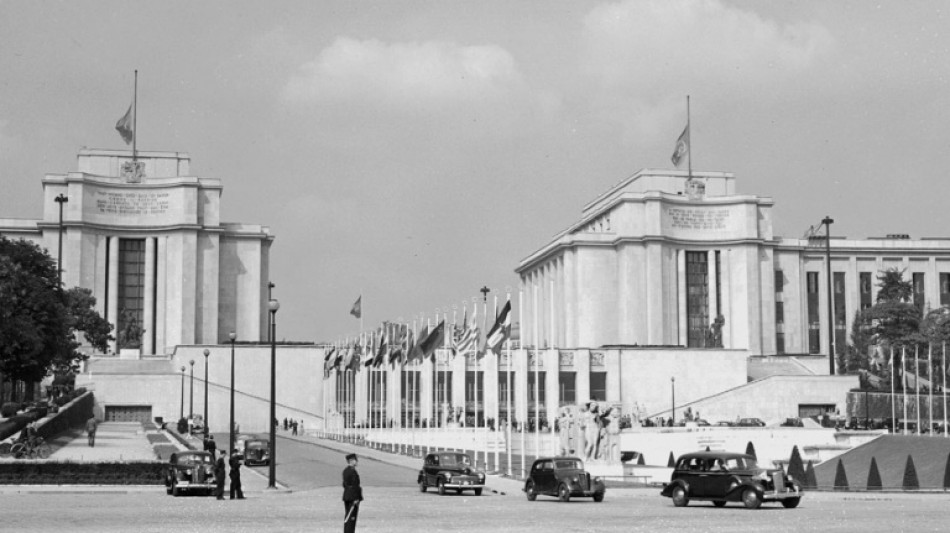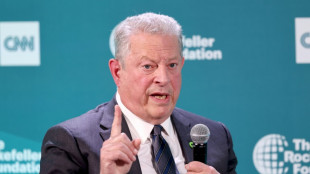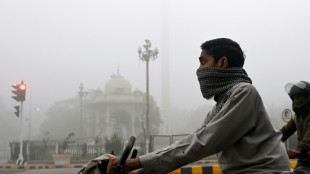
-
 China tests building Moon base with lunar soil bricks
China tests building Moon base with lunar soil bricks
-
Film's 'search for Palestine' takes centre stage at Cairo festival

-
 Oil execs work COP29 as NGOs slam lobbyist presence
Oil execs work COP29 as NGOs slam lobbyist presence
-
Gore says climate progress 'won't slow much' because of Trump

-
 'Megaquake' warning hits Japan's growth
'Megaquake' warning hits Japan's growth
-
Stiff business: Berlin startup will freeze your corpse for monthly fee

-
 Wars, looming Trump reign set to dominate G20 summit
Wars, looming Trump reign set to dominate G20 summit
-
Xi, Biden attend Asia-Pacific summit, prepare to meet

-
 Kyrgios to make competitive return at Brisbane next month after injuries
Kyrgios to make competitive return at Brisbane next month after injuries
-
Dominican Juan Luis Guerra triumphs at 25th annual Latin Grammys

-
 Landslide win for Sri Lanka president's leftist coalition in snap polls
Landslide win for Sri Lanka president's leftist coalition in snap polls
-
Australian World Cup penalty hero Vine takes mental health break

-
 As Philippines picks up from Usagi, a fresh storm bears down
As Philippines picks up from Usagi, a fresh storm bears down
-
Tropical Storm Sara pounds Honduras with heavy rain

-
 Pepi gives Pochettino win for USA in Jamaica
Pepi gives Pochettino win for USA in Jamaica
-
'Hell to heaven' as China reignite World Cup hopes with late winner

-
 Rebel attacks keep Indian-run Kashmir on the boil
Rebel attacks keep Indian-run Kashmir on the boil
-
New Zealand challenge 'immense but fantastic' for France

-
 Under pressure England boss Borthwick in Springboks' spotlight
Under pressure England boss Borthwick in Springboks' spotlight
-
All Blacks plan to nullify 'freakish' Dupont, says Lienert-Brown

-
 TikTok makes AI driven ad tool available globally
TikTok makes AI driven ad tool available globally
-
Japan growth slows as new PM readies stimulus

-
 China retail sales pick up speed, beat forecasts in October
China retail sales pick up speed, beat forecasts in October
-
Asian markets fluctuate at end of tough week

-
 Gay, trans people voicing -- and sometimes screaming -- Trump concerns
Gay, trans people voicing -- and sometimes screaming -- Trump concerns
-
Argentina fall in Paraguay, Brazil held in Venezuela

-
 N. Korean leader orders 'mass production' of attack drones
N. Korean leader orders 'mass production' of attack drones
-
Pakistan's policies hazy as it fights smog

-
 Nature pays price for war in Israel's north
Nature pays price for war in Israel's north
-
New Zealand's prolific Williamson back for England Test series

-
 Mexico City youth grapple with growing housing crisis
Mexico City youth grapple with growing housing crisis
-
After Trump's victory, US election falsehoods shift left

-
 Cracks deepen in Canada's pro-immigration 'consensus'
Cracks deepen in Canada's pro-immigration 'consensus'
-
Xi inaugurates South America's first Chinese-funded port in Peru

-
 Tyson slaps Paul in final face-off before Netflix bout
Tyson slaps Paul in final face-off before Netflix bout
-
England wrap-up T20 series win over West Indies

-
 Stewards intervene to stop Israel, France football fans clash at Paris match
Stewards intervene to stop Israel, France football fans clash at Paris match
-
Special counsel hits pause on Trump documents case

-
 Japan's Princess Mikasa, great aunt to emperor, dies aged 101
Japan's Princess Mikasa, great aunt to emperor, dies aged 101
-
Cricket at 2028 Olympics could be held outside Los Angeles

-
 Trump names vaccine skeptic RFK Jr. to head health dept
Trump names vaccine skeptic RFK Jr. to head health dept
-
Ye claims 'Jews' controlling Kardashian clan: lawsuit

-
 Japan into BJK Cup quarter-finals as Slovakia stun USA
Japan into BJK Cup quarter-finals as Slovakia stun USA
-
Sri Lanka president's party headed for landslide: early results

-
 Olympics 'above politics' say LA 2028 organisers after Trump win
Olympics 'above politics' say LA 2028 organisers after Trump win
-
Panic strikes Port-au-Prince as residents flee gang violence

-
 Carsley hails England's strength in depth as understudies sink Greece
Carsley hails England's strength in depth as understudies sink Greece
-
Undefeated Chiefs lose kicker Butker to knee injury

-
 Wallabies winger Vunivalu signs for La Rochelle
Wallabies winger Vunivalu signs for La Rochelle
-
Musk met Iran UN ambassador on defusing tension under Trump: NYT

| SCS | -0.75% | 13.27 | $ | |
| NGG | 0.4% | 62.37 | $ | |
| CMSC | -0.24% | 24.55 | $ | |
| RIO | -0.31% | 60.43 | $ | |
| BP | 1.65% | 29.05 | $ | |
| BTI | 0.2% | 35.49 | $ | |
| CMSD | -0.02% | 24.725 | $ | |
| BCC | -1.57% | 140.35 | $ | |
| RBGPF | 100% | 61.84 | $ | |
| AZN | -0.38% | 65.04 | $ | |
| RYCEF | -4.71% | 6.79 | $ | |
| RELX | -0.37% | 45.95 | $ | |
| BCE | -1.38% | 26.84 | $ | |
| GSK | -2.09% | 34.39 | $ | |
| JRI | -0.23% | 13.21 | $ | |
| VOD | -0.81% | 8.68 | $ |

Universal Declaration of Human Rights turns 75
On December 10, 1948, the United Nations adopted the Universal Declaration of Human Rights in the hope of creating a better world after the horrors of World War II.
Coming three years after the Allied victory over the Nazis, it was the first time that countries had agreed to protect fundamental rights and freedoms on a universal scale, for all people.
It was also one of the first achievements of the United Nations, itself born from the ashes of the Second World War, and inspired the development of international human rights law.
Its adoption in Paris was hailed with a lengthy standing ovation from delegates determined that the world would never again see the likes of Auschwitz, Hiroshima and other atrocities.
Although not legally binding, the declaration stresses the supremacy of individual rights over those of states.
It puts economic, social and cultural freedoms on the same level as civil and political rights.
Human rights were no longer exclusively an internal affair, as Hitler had claimed to prevent foreign interference. They were now a universal issue.
On the 75th anniversary of the adoption of the milestone charter, here is some historical background.
- Divided world seeks consensus -
The UN's first General Assembly in 1946 created a Commission on Human Rights -- made up of 18 members from various political, cultural and religious backgrounds -- to work on an international bill of rights.
The drafting committee first met in 1947 under the dynamic chairmanship of Eleanor Roosevelt, widow of the US president Franklin D. Roosevelt.
Its other representatives were from eight countries selected according to their geographical location, with Canada's John Peters Humphrey and France’s Rene Cassin playing key roles in the drafting.
"It is the first document of an ethical sort that organised humanity has ever adopted," recalled Cassin.
It was inspired by the principles behind the United States Declaration of Independence of 1776 and France’s Declaration of the Rights of Man and of the Citizen of 1789.
Several women played key roles in the drafting, namely Hansa Mehta, a fervent advocate of women's rights in India and abroad.
She is widely credited with changing Article 1 of the Universal Declaration of Human Rights from "All men are born free and equal" to "All human beings are born free and equal".
The declaration was adopted by the UN's third General Assembly in Paris on December 10, 1948.
It was supported by 48 of the UN's then 58 member countries.
Two others -- Yemen and Honduras -- were absent.
The remaining eight abstained -- Belarus, Czechoslovakia, Poland, the Soviet Union, Ukraine, Yugoslavia, apartheid South Africa and Saudi Arabia, which challenged the notion that men and women were equal.
- Inspiring but contested -
"At a time when the world was divided into Eastern and Western blocs, finding a common ground on what should make the essence of the document proved to be a colossal task," the UN says on its website.
Communists said there was an over-emphasis on individual and political rights at the expense of social rights.
Western democracies were wary of the declaration becoming a restrictive legal tool that could be used against them by their own their colonies.
Despite the doubts and debates at the time, the Universal Declaration of Human Rights inspired all post-war treaties and is regarded as the foundation of international human rights law.
The international conventions against the discrimination of women in 1979 and against torture in 1984; the rights of children in 1990; the creation of the International Criminal Court in 1998 -- all are its direct descendants.
It also inspired the "right to intervene" in another country on humanitarian grounds, as championed by former French foreign minister Bernard Kouchner, who co-founded Doctors Without Borders (MSF).
But the declaration has not been able to prevent violations of the rights it espouses.
Nor has it escaped criticism, including that the concept of "universalism" is little more than a Western diktat.
And it has met ideological, cultural and religious resistance from various countries, such as China and Russia as well as those that apply Islamic Sharia law.
Seventy-five years after its adoption, there are calls for the declaration to be updated, for example, to incorporate challenges such as climate change, mass migration and modern technologies.
Bur-cf-ccd-rap/mw/eab/gil/bp
L.Janezki--BTB

